Drawn by William Schmitt |
Mussolini |
||||||||||||||||||
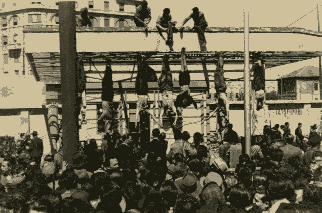 |
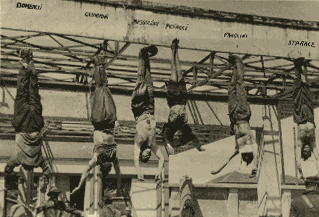 |
||||||||||||||||||
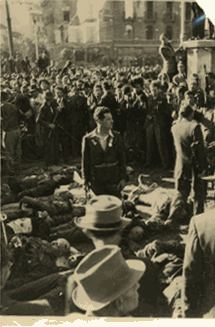 |
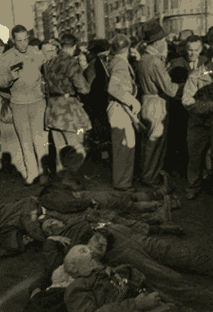 |
||||||||||||||||||
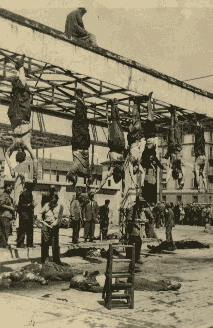 |
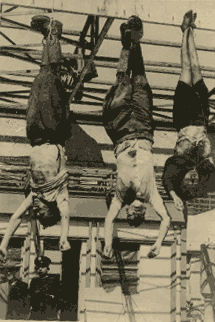 |
||||||||||||||||||
Drawn by William Schmitt |
Mussolini |
||||||||||||||||||
 |
 |
||||||||||||||||||
 |
 |
||||||||||||||||||
 |
 |
||||||||||||||||||
| Benito Mussolini was born on July 29th, 1883 in the town of Varnano
dei Costa near the village of Predappio. His mother Rosa Maltoni was married
to a blacksmith named Alessandro Mussolini. Alessandro, being an admirer
of the Mexican revolutionary Juarez, named his son after the patriot and
hero. Benito Mussolini was an avid writer and after he finished his schooling,
he became an editor for the Milan socialist paper "Avanti". He became well
known among the Italian socialists, but soon started promoting his views
for war against Germany in World War I. This infuriated the Socialists
who were against Italy's entry into the war. In 1915 he formed his own
paper, Il Popolo d'Italia, and continued his promotion for war. When Italy
finally joined the Allies to fight Germany, Mussolini enlisted into the
"Esercito" (Army). Mussolini achieved the rank of Corporal, the same rank
as Adolf Hitler, but was discharged in 1917 due to shrapnel wounds while
in a trench. He returned to his career in journalism in which he began
to develop his ideas that would soon become known as Fascism. After the
war, Italy was in turmoil. The economy was shattered and there were strikes
and protests everywhere. On March 23, 1919, Mussolini and several other
veterans formed the National Fascist Party. This party grew in popularity
among the people of Italy, who were disenchanted with the chaos surrounding
them. Mussolini seemed to have the answers to bring their country into
order. During this time, he adopted the Roman salute and the Black Shirt
militia, which Hitler later copied from the him as the Brown Shirts. On
March 15th 1921, Mussolini along with 35 other Fascists were elected to
the Italian Chamber of Deputies .
In August of 1922, The ruling Leftist party ordered a general strike in the nation. Mussolini was enraged and issued an ultimatum that if they did not end the strike, his Fascist party would. The Leftist claimed he was trying to seige the government, but the armed forces wanted nothing to do with stoping the fascists from preventing the strike. On October 29, 1922, King Victorio Emmanuele III (1869-1947) phoned Mussolini to come to Rome and form a government. Mussolini insisted on a telegram and it was wired soon afterwards. Mussolini boarded a train to Rome and was greeted by thousands of Fascist Blackshirts awaiting his arrival. His first act was to send the strikers back home to their families and their jobs. Mussolini managed to assume the powers of all the government offices in order to regain control of the economy. In a short period of time, he was successful in stabilizing the economy and taking his country out of economic turmoil. He became known as "Il Duce" (the leader). His first international crisis as head of Italy made him an Italian hero. The crisis was a border dispute between Greece and Albania. Mussolini sent several men to the area representing Italy as part of an International Commission to dispute the issue. On August 23, 1923, all the Italians were murdered and discovered in Greek territory. In a rage, Mussolini sent the Greek government a list of demands , including a public apology, immediate inquiry into the killings, death sentence to those convicted and payment of 50 million Lira within 5 days. The Greeks refused the demand, since they did not know if it was Greeks who committed the murders. Mussolini ordered the Italian navy to bombard Corfu (Kerkyra) off the Greek coast. The shelling was then followed by an amphibious landing of Italian marines. After the League of Nations condemned the act, Mussolini threatened to pull Italy out of the League. He insisted that the Conference of Ambassadors, who formed the original mission in the first place, must arbitrate the dispute. France, wanting Italy's support over the mineral rich Ruhr Valley, sided with Italy. As a result, the Conference of Ambassadors endorsed most of Italy's position. The Greek government gave in and agreed to Il Duce's demands. This victory was immediately followed by Mussolini sending elements of the Italian Esercito into the city of Fiume and annexing it from Yugoslavia. Mussolini was eventually made a British Knight of the Bath, but that was canceled in August of 1940. Although Mussolini quenched his thirst for power, he was still enraged by the treatment Italy received for their part in defeating the Germans and Austrians in World War I. He had visions of a new Roman Empire and he could see the day when the Mediteranean Sea became the "Mare Nostrum"(Our Sea). The invasion of Ethiopia, commanded by Field Marshal Pietro Badoglio, in many ways a revenge against the Italian defeat at Adwa in 1896, and the Italian military assistance in Spanish Civil War, reflected his dreams coming to life. But Mussolini found his country blacklisted by the League of Nations and it forced his relationship closer to Nazi Germany, which was also isolated for their actions. Mussolini soon realized that the League of Nations did not have the backbone to stop Hitler or himself in gaining new colonies, so he pressed forward. On the April 7, 1939, Mussolini invaded Albania and on May 22,1939, Italy and Germany cemented their alliance with the Pact of Steel. Italy would find limited success in the war, his conquests in Africa, Greece and Yugoslavia slowly vanished due to poor leadership in the military, and lack of fuel to power their forces. By 1943, Italy was losing the war. In July 1943, Mussolini was deposed by a revolt within his own Fascist Grand Council, and Victor Emmanuael III, the King of Italy, reduced to a figurehead by Mussolini, appointed Marshall Badoglio to be the new Prime Minister of Italy. Mussolini was arrested but later rescued by German paratroopers in a mountaintop resort where he was imprisoned. After his rescue, he set up the Italian Socialist Republic in German-held northern Italy, with himself as its leader. On April 28, 1945, Mussolini and his mistress Clara Petacci, were arrested
again by Italian partisans by Lake Como. Walter Audisio (1909-1973), who
was once pardoned by Mussolini for a jail term in 1934, took custody of
Mussolini and Petacci. Mussolini, realizing he was going to killed, opened
up his shirt and asked to be shot in the chest. Audisio complied and attempted
to shoot the pair with an Italian submachine gun, but it would not fire.
He then pulled out an Italian pistol and again it would not fire. In desperation
he grabbed a French weapon, a MAS 7.65, from a fellow partisan and killed
them both. Their bodies were strung upside down the next day for all to
see.
|